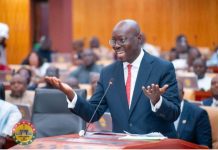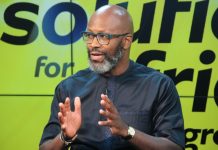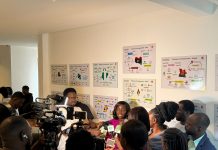Professor Samuel Ato Duncan, President-General of the Center for Awareness Global Peace Mission, has called for a global shift in mindset to achieve sustainable peace.
Speaking at the launch of the Blueprint for Sustainable Global Peace on November 18, 2024, at the Accra International Conference Centre, Prof. Duncan emphasized the importance of fostering peace at the grassroots level—starting with families and extending to communities and nations.
“You don’t spend anything by promoting peace in your homes,” he said. “Sit down with your children and your spouse, and talk about peace, love, and truth. Teach your children the way they should grow, for when they grow up, they will not depart from it. This is how we build a future of peace, harmony, and reconciliation.”
He urged individuals to prioritize love and truth in their daily interactions as a foundation for fostering unity and societal growth.
By instilling these values in the next generation, he noted, humanity can achieve a future characterized by oneness and mutual understanding.
Prof. Duncan also highlighted the critical role of research and innovation in advancing global peace. He shared that his organization collaborates with various institutions to support initiatives focused on peace, environmental preservation, creative thinking, leadership, and the empowerment of women and marginalized groups.
He expressed concern over the economic cost of global conflict and violence, citing a World Bank report that estimated the global economic loss from conflicts in 2023 alone at $19.1 trillion.
He contrasted this figure with the $5.4 trillion needed annually to achieve the Sustainable Development Goals (SDGs) between 2023 and 2030, arguing that redirecting resources currently spent on conflict could significantly advance global development.
“When $19.1 trillion is used for violence and conflict, while $5.4 trillion is needed annually to achieve the SDGs, can’t we redirect this money to reduce poverty, end hunger, and ensure quality education and healthcare for all?” he questioned.
Focusing on Africa, Prof. Duncan revealed that the continent spends $18 billion annually on conflict-related costs, which impacts 15–20% of its GDP.
He argued that implementing the Blueprint for Sustainable Peace could save Africa billions of dollars, boost GDP, and enhance development outcomes.
“The Blueprint will reduce conflicts and save billions of dollars to support human development. It will also prevent infrastructure damage, loss of human lives, and achieve annual global GDP growth of 15–20%. Additionally, it will help prevent 310,000 deaths caused by violence each year,” he explained.
Prof. Duncan stressed the importance of addressing the root causes of conflict and fostering a collective commitment to peace.
He called for national, regional, and international cooperation to promote conflict prevention, uphold human rights, strengthen governance, and address the factors that threaten peace.
He also underscored the interconnected nature of global peace, noting that the peace in one country can be compromised if external forces do not share similar values.
“Peace in Ghana, for example, can be compromised if external forces do not also change their mindset. This is why peace must be a global agenda,” he said.
Prof. Duncan concluded by emphasizing the need for humanity to live according to the fundamental principles of peace, focusing on love and truth. By recognizing the value of human life and aligning with the purpose of creation, he said the world could achieve lasting global peace.
“Promoting conflict prevention, fostering dialogue, and addressing the root causes of conflict are essential steps. If we change our mindset and live by the law of peace, the world will experience sustainable global harmony,” he added.
He urged all stakeholders to commit to the Blueprint for Sustainable Peace, which he believes has the potential to transform societies and foster a more peaceful and secure world.




















































